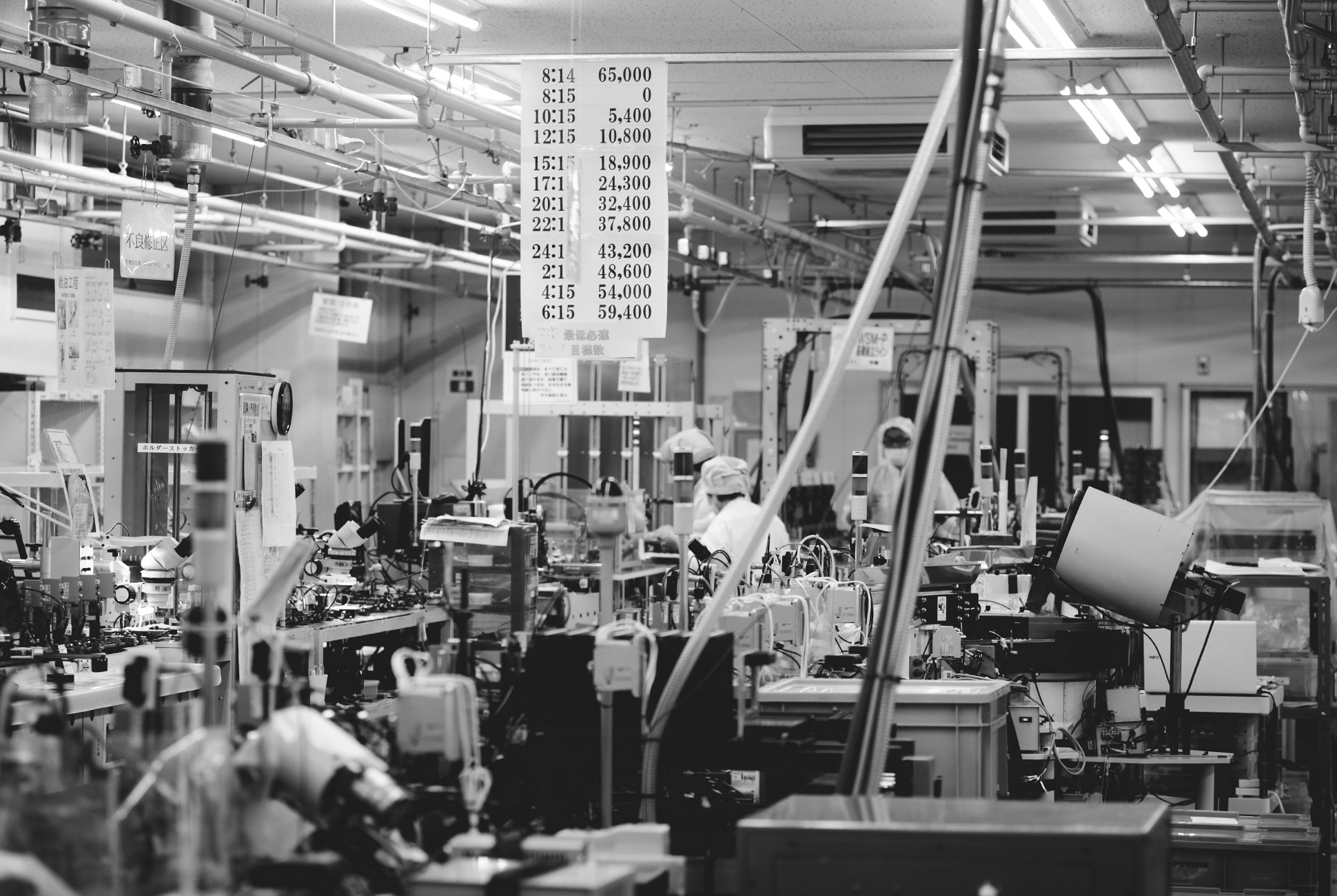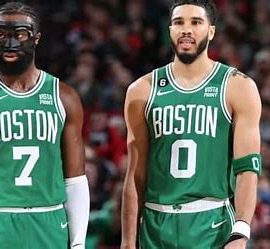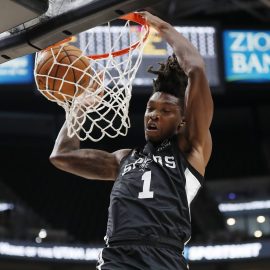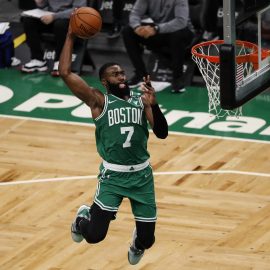Every morning, we compile the links of the day and dump them here… highlighting the big story line. Because there’s nothing quite as satisfying as a good morning dump.
In Hayward’s absence, and Irving’s more recently, so many good things have happened. Tatum and Brown blossomed into legitimate high-quality NBA players, with the promise of greater achievements ahead.
Marcus Morris, acquired for the popular Avery Bradley over the summer, turned out to be a welcome addition, a gruff, no-nonsense type on the surface who is secretly likable, especially when he’s hitting yet another huge shot.
They tell us Greg Monroe came over after being bought out by the Suns, but I suspect he somehow arrived from the NBA of the ’80s. He is a relic, a back-to-the-basket big man, but he sure is an enjoyable one, especially when he’s throwing those pinpoint lefty bounce passes to darting cutters.
I suppose the heady expectations for next year would count as delayed gratification if they are fulfilled. But the frustration of the injuries shouldn’t be underplayed, in part because these may be the last weeks as a Celtic for some of these likable players.
So here we are again, at the end of a season where the Celtics have exceeded not only their pre-season predictions, but the in-season predictions as well, and they’ve done so with a young and scrappy crew of talented players, outcasts and misfits. Sound familiar?
This season is a like when Van Halen covered “You Really Got Me” by the Kinks–it was louder, sharper, edgier, but still–quite obviously–the same song.
Now we’ve got a team that’s even crazier than last season’s assemblage of second rounders, in that we’ve got guys who weren’t even in the league last year contributing major minutes, the injuries are more extreme, but the melody is still the same: Brad Stevens takes a bunch of smart, scrappy, motivated guys farther than anyone expected.
And the reason for all that? Kaizen baby.
Kaizen, continuous improvement, comes from a Sioux City born engineer named W. Edwards Deming.
Deming’s key insight was to look at manufacturing and corporate decision-making processes as products in and of themselves. If a company was in the habit of continually improving its products, and not letting them get stale and uncompetitive over time, it should just as obviously examine the processes it used to develop and produce those products and subject them to the same scrutiny and ongoing improvement.
It is, in hindsight, an incredibly obvious logical leap, but our Iowa born, Cody, Wyoming, raised Deming found no audience for his ideas in the US. By chance he ended up working for Douglas MacArthur after World War II, and that put him in Japan right as the US was funneling money into that country to keep it from going Communist, and along with that money, the US was loaning manufacturing expertise.
Deming found listening ears in Japan. Essentially, that country’s entire manufacturing industry recognized the value of his approach to corporate processes and as a result, the crappy Japanese products of the early 50s (which were occasionally stamped ‘Made in Usa‘) became the cheap, dependable Japanese electronics of the 60s and cars of the 70s and 80s.
Kaizen.
Thing is, this ain’t rocket science–but you do need a certain mental flexibility. To the credit of the players on the team, they have that flexibility:
When Brown’s shots missed, they were often missing badly, slapping off the side, front, or back of the rim rather than swirling in-and-out on an unfortunate bounce. It seemed to Shrewsberry that Brown, whose intensity is usually quite noticeable on his face during a game, was thinking about the last play or the next play. He was not thinking about that quiet moment at the foul line.
“We just tried to get him to slow everything down and take a little more time,” Shrewsberry said. “He’d catch the ball and he’d really just rush into his free-throw attempt instead of moving from one thing to the next.
“My big thing was to just take a deep breath and pause before he started anything within his shot, just to kind of clear his mind of whatever just happened.”
…
“I have the same form,” Brown said. “I just slowed down a little bit more and just focused a little bit. I took a deeper breath, just to relax myself. That’s about it. I feel more relaxed. I feel more comfortable now.”
“I didn’t have a vision originally. In the beginning, it was just about me coming in and getting acclimated,” [Monroe] said. “Obviously, it’s not just me, but it’s a bunch of guys that have to play more because of injuries. So we all have to do a good job of stepping up and embracing our expanding roles and making sure we are doing what we need to do to make the team successful.
…
Every game, every team is a little bit different, as far as how we want to attack. Before the game, he does whatever needs to be done to make sure that guys understand the way we want to attack and that just makes it easy on guys.”
If Stevens is playing the role of Deming, the players are the Japanese companies that actually listened to him and saw the value of what he was stressing–be willing to evaluate every aspect of your processes, and be flexible enough to change things on the fly.
Last year the Celtics won 53 games with a, shall we say, problematic defense. This year they’ve won at least 54 with the league’s best defense.
We know Stevens likes his defense, but last year he figured out how to make the most of a supremely gifted offensive team–he didn’t insist on doing things the same way he did them the year before.
And then there’s the players. Guys like Brown and Irving who think about the game, and who can adapt.
Guys like good ol’ Evan Turner, Jae Crowder, Shane Larkin, Amir Johnson and Aron Baynes. These guys had to adapt the way they played and what they expected to get, and in return, they were put in a position to shine.
Kaizen–or, the Growth Mindset, if you will.
And, surprise, surprise, that willingness to learn, adapt, change works in other areas of life as well.
Page 2: Where somebody must be cutting onions, or maybe it’s a bit dusty in here
I like to believe I can recall, on demand and command, pretty much every Larry Bird no-look pass and dagger 3 from his full and fulfilling Celtics career. But the original visual was always provided by a television, or via Johnny Most’s nicotine-choked crackles from the car radio.
I never saw Larry play in person.
I know. It’s a void, one in my soul as a sports fan and, nowadays, my resume as Boston sports writer. I witnessed his entire career, every game I could. And yet I missed out. When Brent Musberger would tell us “You’re looking live!” at Boston Garden during his intro to CBS’s coverage of one huge mid-‘80s showdown or another, I always envied those fans in the crowd on television, inside the building.
How did you get to be inside? Who did you have to know? How lucky could you be? How rich?
Look, I’m sorry if you wasted your spare time reading my odd attempt to link manufacturing and basketball, because really, what you should’ve done is read Chad Finn’s piece for the Globe.
If you’ve got time now, go read it–all of it–I’ll wait.
…
See? Good stuff, huh? This is what I like about sports–forget the ‘hot takes’ and the obnoxious fans, and the constant complaining, and yes, even the advanced stats and second-by-second breakdowns of plays (the first three are, I think we can all agree, universally obnoxious, the last two just aren’t my cup of tea).
It’s the experience. Martin Heidegger and Edmund Husserl both revolutionized epistemology (the study of knowledge and the acquisition of knowledge) by revealing that knowledge acquired through analysis (e.g. this hammer has a hickory handle, a cast iron head, it weighs 19.2 ounces, etc), was but one form of knowledge. They observed that there were other types of knowledge that were less obvious, but just as important, such as the knowledge of a hammer that one acquires through use and experience (e.g. the physical act of hammering nails requires a certain type of knowledge).
You can ‘get’ the Celtics a variety of ways–and Chad’s highlighted my favorite way: Just by sitting and watching them in good company.
The rest of the links
MassLive: Boston Celtics news: Marcus Smart expected to return at six weeks, cleared for non-contact shooting | Boston Celtics reserves Semi Ojeleye, Jabari Bird shine with increased opportunity
Boston Herald: NBA looks for playoffs not marred by more player-ref strife (hah! Good luck)
NBC Sports: The cupboard isn’t bare | Report: Former Celtics star signs with Cavs
Add The Sports Daily to your Google News Feed!






